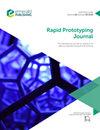Study of parametric interaction during fused filament fabrication (FFF) using interpretive structural modelling (ISM) followed by experimental analysis
IF 3.6
4区 工程技术
Q1 ENGINEERING, MECHANICAL
引用次数: 0
Abstract
Purpose Fused filament fabrication (FFF) is a type of additive manufacturing (AM) based on materials extrusion. It is the most widely practiced AM route, especially used for polymer-based rapid prototyping and customized product fabrication in relation to aerospace, automotive, architecture, consumer goods and medical applications. During FFF, part quality (surface finish, dimensional accuracy and static mechanical strength) is greatly influenced by several process parameters. The paper aims to study FFF parametric influence on aforesaid part quality aspects. In addition, dynamic analysis of the FFF part is carried out. Design/methodology/approach Interpretive structural modelling is attempted to articulate interrelationships that exist amongst FFF parameters. Next, a few specimens are fabricated using acrylonitrile butadiene styrene plastic at varied build orientation and build style. Effects of build orientation and build style on part’s ultimate tensile strength, flexure strength along with width build time are studied. Prototype beams (of different thickness) are fabricated by varying build style. Instrumental impact hammer Modal analysis is performed on the cantilever beams (cantilever support) to obtain the natural frequencies (first mode). Parametric influence on natural frequencies is also studied. Findings Static mechanical properties (tensile and flexure strength) are greatly influenced by build style and build orientation. Natural frequency (NF) of prototype beams is highly influenced by the build style and beam thickness. Originality/value FFF built parts when subjected to application, may have to face a variety of external dynamic loads. If frequency of induced vibration (due to external force) matches with NF of the component part, resonance is incurred. To avoid occurrence of resonance, operational frequency (frequency of externally applied forces) must be lower/ higher than the NF. Because NF depends on mass and stiffness, and boundary conditions, FFF parts produced through varying build style may definitely correspond to varied NF. This aspect is explained in this work.利用解释结构模型(ISM)对熔丝制造过程中的参数相互作用进行了研究,并进行了实验分析
目的熔丝制造(FFF)是一种基于材料挤压的增材制造(AM)。这是最广泛实践的增材制造路线,特别是用于与航空航天,汽车,建筑,消费品和医疗应用相关的基于聚合物的快速原型和定制产品制造。在FFF过程中,零件质量(表面光洁度、尺寸精度和静态机械强度)受几个工艺参数的影响很大。本文旨在研究FFF参数对上述零件质量方面的影响。此外,还对FFF部分进行了动态分析。设计/方法/方法解释性结构建模试图阐明FFF参数之间存在的相互关系。接下来,使用丙烯腈-丁二烯-苯乙烯塑料在不同的建造方向和建造风格制作一些标本。研究了构件的搭接方向和搭接方式对构件极限抗拉强度和抗弯强度随宽度搭接时间的影响。原型梁(不同厚度)是由不同的建造风格制造的。对悬臂梁(悬臂支承)进行仪器冲击锤模态分析,得到其固有频率(第一模态)。还研究了参数对固有频率的影响。静态力学性能(拉伸和弯曲强度)受构造样式和构造方向的影响很大。原型梁的固有频率受结构形式和梁厚的影响较大。原创性/价值性造件在受到应用时,可能要面对各种外部动态载荷。如果感应振动(由外力引起)的频率与构件的NF相匹配,则产生共振。为避免发生共振,工作频率(外力频率)必须低于/高于NF。由于NF取决于质量和刚度以及边界条件,因此通过不同的建造方式生产的FFF部件肯定对应于不同的NF。本文对这方面进行了阐述。
本文章由计算机程序翻译,如有差异,请以英文原文为准。
求助全文
约1分钟内获得全文
求助全文
来源期刊

Rapid Prototyping Journal
工程技术-材料科学:综合
CiteScore
8.30
自引率
10.30%
发文量
137
审稿时长
4.6 months
期刊介绍:
Rapid Prototyping Journal concentrates on development in a manufacturing environment but covers applications in other areas, such as medicine and construction. All papers published in this field are scattered over a wide range of international publications, none of which actually specializes in this particular discipline, this journal is a vital resource for anyone involved in additive manufacturing. It draws together important refereed papers on all aspects of AM from distinguished sources all over the world, to give a truly international perspective on this dynamic and exciting area.
-Benchmarking – certification and qualification in AM-
Mass customisation in AM-
Design for AM-
Materials aspects-
Reviews of processes/applications-
CAD and other software aspects-
Enhancement of existing processes-
Integration with design process-
Management implications-
New AM processes-
Novel applications of AM parts-
AM for tooling-
Medical applications-
Reverse engineering in relation to AM-
Additive & Subtractive hybrid manufacturing-
Industrialisation
 求助内容:
求助内容: 应助结果提醒方式:
应助结果提醒方式:


